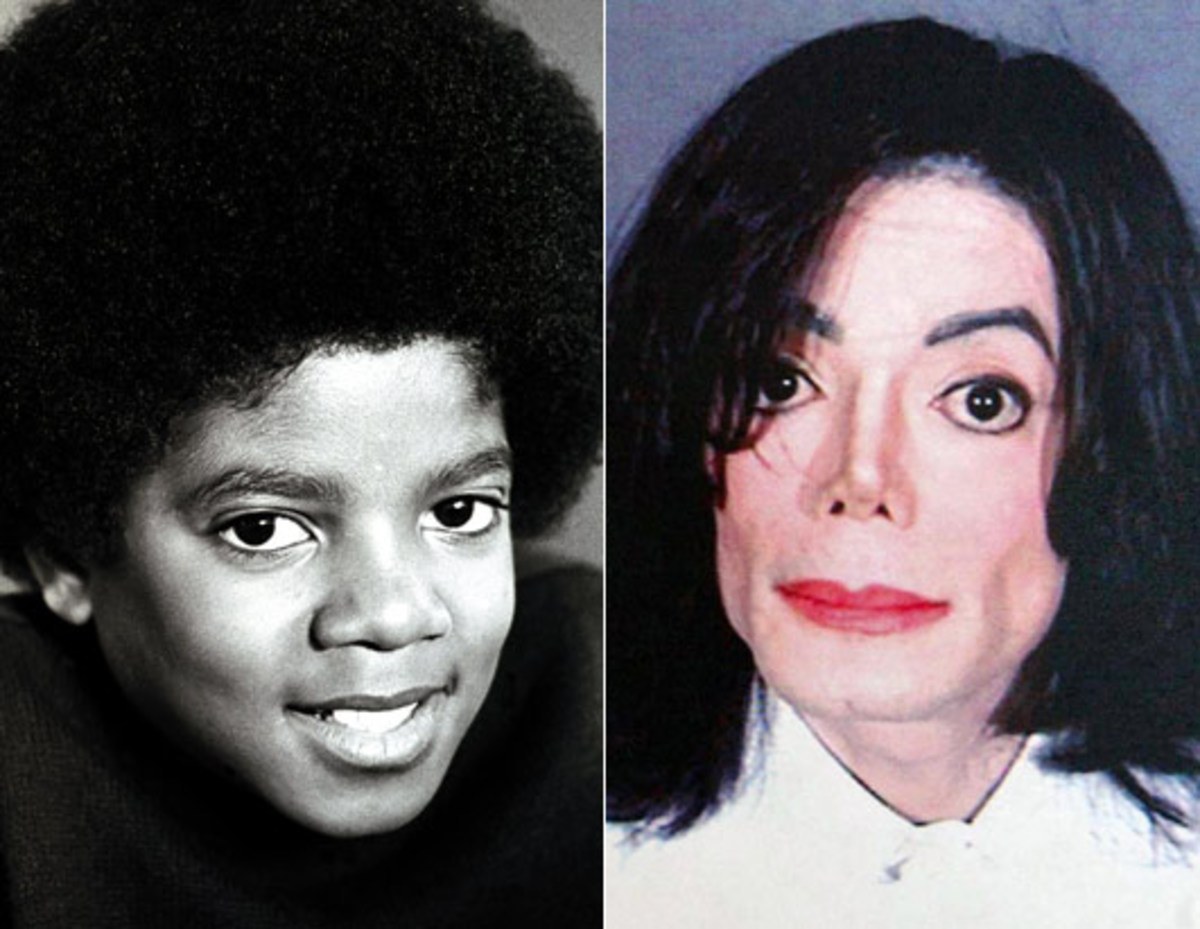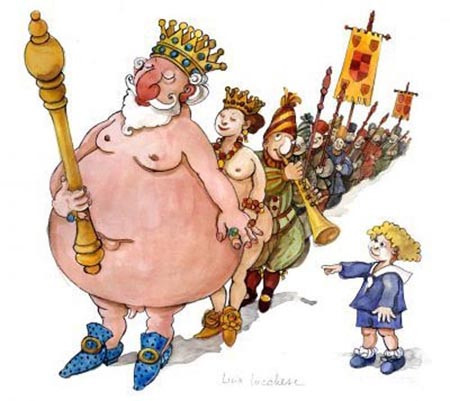by Akim Reinhardt
 Over the course of more than a decade, Michael Jackson transformed from a handsome young man with typical African American features into a ghostly apparition of a human being. Some of the changes were casual and common, such as straightening his hair. Others were the product of sophisticated surgical and medical procedures; his skin became several shades paler, and his face underwent major reconstruction.
Over the course of more than a decade, Michael Jackson transformed from a handsome young man with typical African American features into a ghostly apparition of a human being. Some of the changes were casual and common, such as straightening his hair. Others were the product of sophisticated surgical and medical procedures; his skin became several shades paler, and his face underwent major reconstruction.
As stark as the changes were, perhaps even more jarring were Jackson’s public denials. His transformation was so severe and empirical that it was as plain as, well, the nose on his face. Yet he insisted on playing out some modern-day telling of “The Emperor’s New Clothes,” either minimizing or steadfastly denying all of it. In order to explain away the changes or claim that they had never even happened, Jackson repeatedly offered up alternate versions of reality that ranged from the plausible-but-highly-unlikely to the utterly ludicrous. He blamed the skin bleaching on treatments for vitiligo, a rare skin disorder. He denied altogether the radical changes to his facial structure, claiming his cheek bones had always been that way because his family had “Indian blood.”
It was equal parts bizarre and sad. But in some ways, perhaps the most disturbing aspect of it all were those among Jackson’s loyal fans who swallowed his story whole. Despite the irrefutability of it all, they refuted it. They parroted his narratives in lockstep, repeating his claims and avidly defending the King of Pop from any questions to the contrary.
Today we face a similar situation. But it’s not about a pop star’s face lift. Ludicrous denials of reality and bizarre make believe counter-narratives are now are now central to discourses about politics and the politicized pandemic.
People aren’t really dying of Covid. It’s the Covid vaccines that are killing millions of people. Hundreds of professional athletes have died from the vaccine. January 6th was just a peaceful protest by American patriots. Or yes, it was violent coup attempt, but Trump did nothing to incite it; in fact he heroically tried to stop it, because he knew the truth: it was a false flag operation by Black Lives Matter and/or Antifa terrorists.
These are some of the reality-defying lies currently popular with millions of Americans, and in the case of Covid-19, tens of millions around the world. These utterly absurd, outrageously irresponsible, and phenomenally dangerous lies are loudly spouted by cynical propagandists, and echoed, chapter and verse, by both loyalists who will tout the party line no matter how ridiculous or reckless, and less politicized people who are simply unhinged.
Politicians have always lied, and conspiracy theories have always abounded. Neither is new, of course. However, during the last decade, the extreme messages, and the partisanship they attract, have multiplied to the point that we are now living in what some refer to as The Age of Propaganda.
But of course this is not the first time. Twentieth century totalitarian regimes pioneered the use of propaganda to shape perceptions of reality. For decades, scholars have studied how right wing authoritarian movements subvert the truth to destabilize and ultimately destroy democracies. Outside of academia, the two most famous commentators on totalitarian propaganda are George Orwell and Hannah Arendt (Arendt of course had a Ph.D. and taught at many universities, but always kept a foot outside of academia, refusing tenure track positions and publishing in the popular press). Both were very insightful, but their observations from roughly half-a-century ago have limited application to today’s world.
Orwell understood that abolishing the truth was the hallmark of propaganda. However, in 1984, his most famous consideration of the issue, he was concerned with totalitarianism broadly. His novel intentionally blurs the distinction between right and left. For him, communism and fascism were the same in this way. Eradicating the truth was not just a means to an end; it was also the goal. Forcing people to accept obvious lies was how governments gained their citizens’ full obedience, and that obedience was the key to implementing totalitarian control over their lives.
Orwell’s lumping of right wing and left wing together to better illustrate and unpack totalitarianism made eminent sense in the mid-twentieth century. Similarly, Arendt’s The Origins of Totalitarianism concluded that 20th century totalitarianism reached its heights in both right wing fascist (Nazism) and left wing communist (Stalinism) forms.
However, here in the post-Cold War twenty-first century, there are no actual fascist states, and few remaining communist states. Cuba is slow rolling away from communism. China is of course communist in name and spirit, but in practice it has fused high-octane capitalism to its operations. North Korea stands as the lone, remaining example of a turly totalitarian and truly communist state. As such, it is perhaps the exception that proves the rule. Remote, impoverished, and backwards, it seems more a relic than a harbinger.
China is potentially Orwellian as it strives for total control. And the way it mixes Maoist communist origins and dogma with cutting edge finance capitalism seems in line with the generic left-right totalitarianism of 1984. However, with nearly a billion and a half people to manage, there are enormous cracks in the PRC’s would-be totalitarian system. The most recent, darkly comical example, is China’s addendum to showings of the film Fight Club: ham-fisted text claiming all the criminals were arrested. As if that automatically cancels out the film’s extreme, anti-establishment messaging. This is not meant to dismiss China’s very sincere efforts at and real achievements in totalitarian control over its population. But at the very least we must admit that 21st century China is pursuing a new form of totalitarianism, which does not function exactly the way that observers such as Orwell and Arendt envisioned and understood it, and that these differences make defining it a complicated task.
Be that as it may, the threat facing many democracies around the world today is neither fascist nor communist totalitarianism of the 20th century variety. It is not the totalitarian systems that both Orwell and Arendt described and analyzed so well. Rather, it is authoritarianism, and exclusively the right wing version. Well established democracies seem to be in no danger of being taken over by vast, all-encompassing systems of totalitarian control. Rather, they are slipping into the hands of individual despots. And these despots are, to a man, right wing authoritarians.
Aspiring right wing authoritarian dictators are to be found, among other places, in Brazil (Jair Bolsonaro), Hungary (Viktor Orbán), Turkey (Recep Erdoğan ), the Philippines (Rodrigo Duterte), Poland (Andrzej Duda), and here in the United States, initially in the presidency of Donald Trump, and now in a contest between Trump himself, as he looks to reclaim the White House in three years, and a slew of Republican imitators jockeying to succeed him.
In every country where such despots appear, they build popularity and attack enemies with a raft of lies, many of them as outrageous but far more dangerous than the notion that Michael Jackson never had a nose job.
Given the shift from totalitarianism to authoritarianism, and the right wing’s near exclusive use of the most bizarre and ludicrous propaganda, perhaps it is time reconsider the political use of lies. Instead of examining them as a key to left/right totalitarianism (which they no doubt are), perhaps we need to turn our lenses around and focus on them as specifically anti-democratic. As something that is primarily used destroys democracy, thereby setting the stage for either right wing or left wing, totalitarian or authoritarian movements to replace it. That extreme propaganda functions first and foremost to erode of democratic norms and citizens’ trust in their own democratic government, which is of course the very foundation of democracy.
 And perhaps it is also time to revisit the fable that Michael Jackson played out in his final years.
And perhaps it is also time to revisit the fable that Michael Jackson played out in his final years.
“The Emperor’s New Clothes” was made world-famous by Hans Christian Andersen, who first published his own version in 1837. But it is much older than that. Andersen’s telling was based on a German translation of a 1335 Spanish manuscript. And that earlier medieval text, compiled by Juan Manuel, Prince of Villena, was based on folk tales from the ancient Mediterranean (Aesop) and Persia. There is also a version from India that dates back at least a millennium. It is an age-old tale from around the world with varying details and conclusions. The concern with a powerful politician getting tangled up in obscene lies, it would seem, is nearly as old as politics itself. So let us then look more closely at Andersen’s version, for he shaped it where and when he lived, in the firmament of emerging European nation states, some of which were already evolving into modern democracies.
When the Emperor parades through town in his new non-clothes, the citizenry initially pander to his delusion for fear of upsetting their sovereign. And then an innocent child, who knows no better, blurts out the truth. What then?
In some modern tellings, the crowd is emboldened by this child; they turn on the Emperor, mocking him for his nudity, naivety, and hubris, and he is suitably shamed and chastened. But that is not the ending of Andersen’s version.
When a child says speaks the truth, and his own father rebuts him. “Did you ever hear such innocent prattle?” the father opines, gas lighting his own child. But slowly, word spreads through the crowd. A child has claimed the Emperor is naked. And the town does eventually transform into a joyous mob hurling the truth.
However, the Emperor is not immediately chastened by the irrefutable truth. Rather, he continues to refute it. After all, he himself had bought into this lie. His political credibility now depends upon the truth of it. Likewise, his royal courtiers, including that terrible father, have pinned their own reputations and careers on supporting The Emperor’s Big Lie. It was they who are carrying his long, invisible train behind him. But the Emperor is now worried. He begins to question himself. Are they right? Am I truly naked? Perhaps. But there is too much at stake. He decides:
Akim Reinhardt’s website is ThePublicProfessor.com
